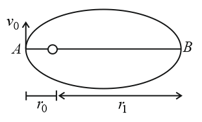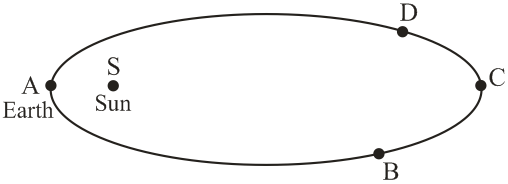Kepler's Laws of Planetary Motion
Kepler's Laws of Planetary Motion: Overview
This topic covers concepts, such as, Kepler's Laws of Planetary Motion, Kepler's Law of Orbits, Kepler's Law of Areas, Kepler's Law of Periods, Explanation of Kepler's Laws, Areal Velocity of Planets & Angular Momentum of Satellites etc.
Important Questions on Kepler's Laws of Planetary Motion
The orbital angular momentum of a satellite is , when it is revolving in a circular orbit at height from earth surface. If the distance of satellite from the earth centre is increased by eight times to its initial value, then the new angular momentum will be
Choose the incorrect statement from the given statements
Duration of a year on a planet is times of the year on the earth. Find the distance of that planet from the sun. The earth is at distance from the sun.
A planet is moving in an elliptical path around the Sun. It does obey Kepler's laws of planetary motion. Read the following statements and identify the correct statements
(I) The potential energy of the planet remains same in the entire path.
(II) The kinetic energy of the planet remains same in the entire path.
(III) The total energy of the planet remains same in the entire path.
(IV) The linear momentum of the planet remains same in the entire path.
(V) The angular momentum of the planet remains same in the entire path.
If a planet moving in a circular path having time period of revolution is suddenly stopped, after what time it will collapse onto the sun?
If a new planet is discovered rotating around the sun with the orbital radius double that of earth, then what will be its time period approximated to the nearest integer (in earth's days)?
(Take )
A satellite describes an elliptic orbit about a planet. Denoting by and the distances corresponding to the perigee and apogee of the orbit. The radius of curvature of the orbit at point and in terms of and is The value of is.

In an atom, two electrons move around the nucleus in circular orbits of radii and . The ratio of the time taken by them to complete one revolution is:
According to Kepler's second law of planetary motion, the areal velocity of a planet revolving around the sun
Assume that the earth moves around the sun in a circular orbit of radius and there exists a planet which also move around the sun in a circular orbit with an angular speed twice as large as that of the earth. The radius of the orbit of the planet is
The annual variations of solar power incident per unit area at a particular point on the Earth's surface is mainly due to the change in the
Many exoplanets have been discovered by the transit method, where in one monitors, a dip in the intensity of the parent star as the exoplanet moves in front of it. The exoplanet has a radius and the parent star has radius . If is the intensity observed on earth due to the parent star, then as the exoplanet transits
A number of planets are revolving around the Sun. Time period is and average orbital radius of a planet is . A graph is drawn between log on the axis and on the axis with the origin at . The graph is a
The period and radius of a circular orbit of a planet about the sun are related by
According to Kepler, the period of revolution of a planet and its mean distance from the sun are related by the equation
If and are the angular momenta of two planets of masses and revolving around the sun in circular orbits of radii and , then is
The distances of two planets from the sun are and , respectively. The ratio of speeds of two planets around sun is
The earth moves in an elliptical orbit with the sun at one of the foci as shown in the figure. Its kinetic energy is maximum at the point

The earth moves around the Sun in an elliptical orbit as shown in figure. The ratio The ratio of the speed of the earth at to that at is nearly

Two planets are moving around the sun. The periodic times and mean radii of the orbits are and respectively. The ratio of is equal to
